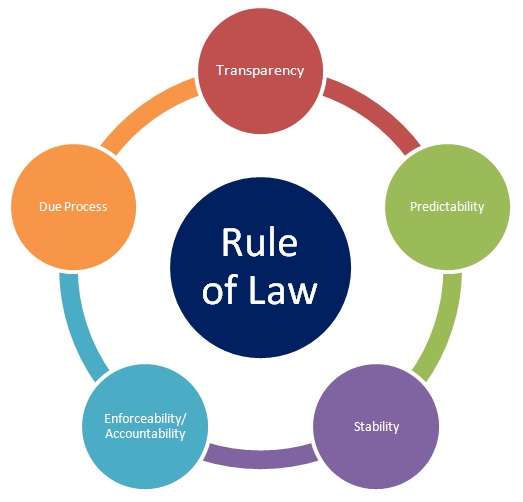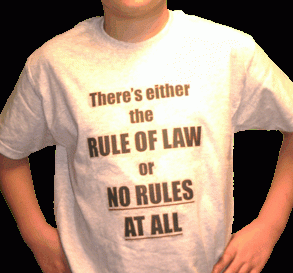 “No-one ever argues that governments should have less integrity, that elected officials should not be accountable, or that public servants should behave unethically. Broad statements of the value of integrity, transparency, accountability and ethics gain general agreement from all sides of politics and from all participants in public debate.
“No-one ever argues that governments should have less integrity, that elected officials should not be accountable, or that public servants should behave unethically. Broad statements of the value of integrity, transparency, accountability and ethics gain general agreement from all sides of politics and from all participants in public debate.
But government integrity demands more than general expressions of goodwill. Enhancing transparency and accountability requires supportive structures as well as declarations of priorities. And cultivating ethical behaviour needs more than simple, sweeping statements of expectations.”
Senator John Faulkner, Political Integrity: The Parliament, the Public Service, and the Parties, University of Melbourne Law School, 4 December 2012
What Senator Faulkner the elder statesman of the Australian Labor Party (“ALP”) is arguing in the opening two paragraphs of his recent speech to the University of Melbourne Law School, is that everyone, whether they be politician, bureaucrat, or indeed by inference Lord Denning’s “reasonable person” (actually reasonable man) which he defined years ago “as someone whom you might meet on a Clapham omnibus” is subject to the law, which is just another way of expressing the concept of the ‘rule of law’. Indeed, in a democracy to live outside of the ‘rule of law’ is to live outside of the constraints of society. To quote from Aristotle, “He who is unable to live in society, or who has no need because he is sufficient for himself, must be either a beast or a god.” (Aristotle Politics, I.1253a27) While I don’t believe that many of my fellow Australians, outside of the ALP, would argue with me if I were to posit the view that no one in the ALP is a god, the same can’t be said for the simile with beasts!
The point is of course that the law must be seen as a means by which to rule and not only to rule, but to rule in a way that ensures equality of treatment for all those subject to the law. In the West, which Australia claims to be part of, beginning with classical Greek civilization, the following question was postured: “What would is the best form of government?” The Greeks came up with two possibilities: “rule by man”, meaning the best men such as Plato’s Philosopher King, a being sorely lacking on the Australian political scene, or “rule by law”, which was initially regarded as a second best option (Plato 1995: 293b-305d; Plato 1941: 427a), Aristotle recognised “rule by law” as being the most realistic option. He came to this conclusion after conducting a tougher examination of the various Greek constitutions on offer at the time.
The focus of all of these debates was on how to produce honest or honourable citizens in a honest society, another way of putting this is that the law was seen as a means by which to rule, rather than a constraint on the King. That being said, in The Laws, Plato made it clear that the law should be the master of the government to restrain potential despots (Plato 1988: 715d), a lesson the beasts in the ALP are yet to learn!
As with modern political discourse, in political practice these debates meant little. What is interesting though is that by the late Roman period the Prince was able to ascend above the law, though by the Christian era he might be subordinate to God, but not to other men. In other words, until the late Roman period, laws existed to order and regulate human affairs and to allow citizens, including rulers, to make choices or face punishments for transgressions. There is little evidence between the late Roman period and the medieval period that kings should be subordinate to the law, and even when this was suggested, there was little said about what institutional arrangements might be appropriate to achieve this. In fact, the impulse to obey the law was said to come only from the monarch’s sense of moral obligation, for no man, and certainly no judge could enforce this. The problem with the ALP is that its corruption runs so deep that it not only lacks any sense of moral obligation, but it has so manipulated the sinews of power that no judge, certainly no judge in the Australian Capital Territory (“ACT”), can or is willing to impose the law on the ALP.
Despite these numerous doctrinal assertions advocating that the king was subject to the law and the argument that no ruler could claim the right to rule without laws, the translation of this idea into an institutionally enforceable arrangement took several centuries, during which there were notable reverses of course and also powerful voices opposed to limiting a sovereign, particularly a monarch, by law. At least we know where the ALP looks for its policies; in medieval tombs of self-interest!
Though the common law legal systems of England and Australia pride themselves on having formulated the ‘rule of law’, in fact it came into being slowly. In England, it was the product of a prolonged political struggle, and in any case was riddled with reverses and exceptions. In the West generally, the ‘rule of law’ went through a prolonged gestation and labour, during which it was plagued by civil wars, violence and revolutions. Importantly, the process was not planned, nor was its success pre-ordained. Nor, it should be said, was the process the same everywhere either in terms of timing or in institutional details.
What is beyond question is that this process resulting in the ‘rule of law’ owes much too emerging practices of government, rather than deliberate planning. The idea that not only should the government rule by law, but should also abide by the rules and even be limited by the rules was an idea that took a long time to actually be established. Much of the debate took place in a pre-capitalist economic environment, where political participation was strictly limited to a very small portion of the population. In England at least, the ‘rule of law’, both as an idea and as a constitutional practice pre-dated the industrial revolution and the emergence of democratic politics. This makes the ALP’s corruption and indifference to, or total disregard for the ‘rule of law’, all the more reprehensible.
The ‘rule of law’ as a formal theory
The modern view of the rule of law seems to have emerged as a doctrine of that name in the late nineteenth century. In essence the ‘rule of law’ involves the following institutional arrangements:
- no person is punishable except for a breach of the law established in the ordinary manner before the ordinary courts of the land; this is in contrast to arbitrary power and excludes wide discretionary authority; and
- no man is above the law; that every person, whatever be his rank and condition, is subject to the ordinary law of the realm and amenable to the jurisdiction of the ordinary tribunals, or equality before the law and this excludes exemptions of officials or others from a duty to obey the law which governs citizens.
 The laws themselves must meet various formal criteria: i.e., they are promulgated to the public, and not secret; are generally prospective not retrospective; are not impossible to comply with; are clear, coherent with each other, and stable; that lawmaking is guided by the law; that persons who make and administer laws are accountable, and actually do administer the law consistently in accordance with the law. More recent writing has extended the list of formal requirements to include institutional arrangements such as a judicial independence, i.e. a judiciary independent of government interference in individual cases; an independent legal profession; access to the courts (see Ms King’s statement for an analysis of how the ALP has manipulated this requirement in the ACT in furtherance of party political ends); the application of the principles of natural justice (i.e., that the decision-makers are not biased in a legal sense and that parties are given a fair hearing); and impartial and honest law enforcement.
The laws themselves must meet various formal criteria: i.e., they are promulgated to the public, and not secret; are generally prospective not retrospective; are not impossible to comply with; are clear, coherent with each other, and stable; that lawmaking is guided by the law; that persons who make and administer laws are accountable, and actually do administer the law consistently in accordance with the law. More recent writing has extended the list of formal requirements to include institutional arrangements such as a judicial independence, i.e. a judiciary independent of government interference in individual cases; an independent legal profession; access to the courts (see Ms King’s statement for an analysis of how the ALP has manipulated this requirement in the ACT in furtherance of party political ends); the application of the principles of natural justice (i.e., that the decision-makers are not biased in a legal sense and that parties are given a fair hearing); and impartial and honest law enforcement.
In relation to the more recent formulations on what the ‘rule of law’ entails, it is worth considering the way the Australian Federal Police, the Australian and ACT Governments and the ALP have treated Mr Julian Moti QC, the former Attorney-General of the Solomon Islands, Captain Fred Martens, the former Commissioner for ACT Revenue, Ms King and Ms Jill Courtney, to realise how far Australia really is as a nation from the ideal. All of the aforementioned cases have been discussed in detail on Blak and Black.
More importantly, especially when we consider many of the aforementioned cases, purely procedural models have also emerged in which the stress is upon due process, i.e., being given a hearing by independent judicial or administrative officers, leading to reasoned decisions articulated in terms of the governing rules. This is something that to date has been denied Ms King, ‘Pat’ the former Commissioner for ACT Revenue and Captain Martens at least in part. As with all formal theories, there is no way these positivist criteria can be used to distinguish between regimes that are democratic or humane and those that deny human rights impoverish the people and practise racial segregation and religious persecution. Only a naive person would argue that Australia does not practice some or all of these human rights impoverishments on certain classes of its citizenry. Unfortunately, for those of us in Australia who fall into one or more of the so called undesirable categories, as long as the regime, whatever its character, abides by the formal criteria of the law, the rule of law can be said to exist.
The problem with this view is that while it proved a way of distinguishing between arbitrary government, i.e. government where there are either no rules, or rules of a certain type, and those governments adhering to the concept of the ‘rule of law’ in the formal sense, this model was compatible with a range of political regimes including apartheid South Africa and Nazi Germany, both of which had rules and laws. The problem was that the laws were unjust, and in both cases deliberately discriminatory. See the way the ACT Government has treated its first and only Aboriginal Commissioner for Revenue? Such a political and legal order is not compatible with equality nor, given its racial basis, is it compatible with universalistic criteria of the modern world such as civic equality, irrespective of one’s background. Various regimes quickly discovered that control over the legislative process gave them the capacity to construct oppressive laws to preserve the regime in power and to thwart demands for accountability. This extends to the ALP dominated ACT Legislative Assembly.
Obviously the words spoken by Senator Faulkner are important concepts; the only question remaining to be answered and in this case, the answer has to be by action not words, is does the Australian Prime Minister Julia Gillard have the courage and authority to impose the ‘rule of law’ on her own party, the ALP, the same party as Senator Faulkner has called to eradicate corruption wihtin its ranks, and compensate all the victims of ALP corruption? Or will it be business as usual with Senator Faulkner’s words becoming just another veneer attempting to hide the true rot from the eyes of an increasingly cynical Australian public?


I found the website just today. It will help me to develop the study of law related facts and features. I shall visit regularly.